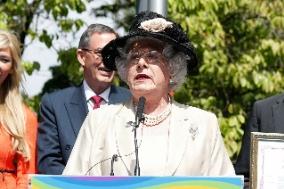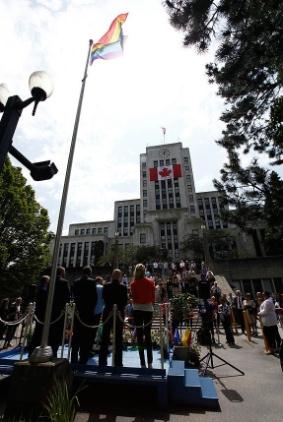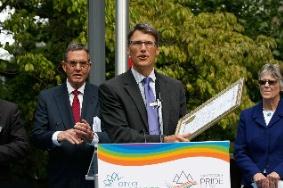
Bill Monroe, one of three grand marshals at this year's parade, graced city hall's launch with his alter ego, the Queen. Credit: Shimon Karmel

The Pride flag unfurls in the breeze at the official launch of Pride Week, held July 30 at city hall. Credit: Shimon Karmel
For the first time in eight years, Vancouver Mayor Gregor Robertson will not be in the Pride parade when it takes to the streets at noon on Sunday, Aug 5.
Instead, he’ll be on a business mission to the London Olympics.
“There’s a whole effort to bring jobs and investment back from the UK,” he told Xtra after officially proclaiming July 30 to Aug 5 Pride Week in Vancouver at city hall.
“I’m a little heartbroken to miss this year,” he says, “but I’m sure it will be as epic as past years.”
Bill Monroe, one of three grand marshals at this year’s parade, graced city hall’s launch with her alter ego, the Queen. “I hope you’re not too disappointed that I didn’t skydive from a helicopter with James Bond,” Monroe said in highbrow Queen’s English tones to applause and laughter. “I think that is one entrance I will never repeat.
“To be a queen is very difficult,” Her Majesty observed. “To be a queen for 60 years is even more so.
“You are different and I understand what different is. This week, we are celebrating the right of many to be different. This includes race, religion, sexual orientation and all the different things that make Vancouver and all of British Columbia a delight to live in.”
“It means celebrating the gains and re-committing to more work and achievement towards equality,” Robertson says. “It’s another important checkpoint in our progress.”
Robertson has repeatedly touted Pride as an economic and cultural boon to Vancouver. Asked if the event will finally be granted civic designation, he says it’s still in the works but points to lean budgetary circumstances as a setback to progress on that front.
“We’re hopeful that pressure eases, and we have some more opportunities with funding,” Robertson says. “We’ve got staff working on looking at all the parades and celebrations.”
“There’s a lot of causes and communities that can barely get out on the street to celebrate or protest,” he notes. “The Vancouver Pride Society and all its network have done remarkably well at building such a potent week, and that’s taken a little pressure off the city on the funding side.”
Vancouver Pride Society president Tim Richards says there is much to celebrate in Vancouver and Canada as a whole, but it’s also a week to reflect, to be courageous and to challenge the status quo.
“It is a time to spark conversation and debate — to make statements about what needs to change,” he told the gathering.
“As we begin our city’s 34th Pride Week, let us not be afraid to ask some difficult questions: is it okay for kids to continue to be bullied in schools? Is it okay that transgender members of our community do not share the same rights as everyone else? Is it okay that people in so many countries can be imprisoned or put to death simply because of their sexuality, gender expression or gender identity?”
For this year’s grand marshals — Miss Universe Canada’s first transgender contestant, Jenna Talackova, Monroe and late community activist David Holtzman — questions like these have only served to inspire action, Richards observed.
“This Pride Week I ask you to be brave, be bold, be visible — maybe a little bit of glitter,” he said.
Earlier, a panel of 12 speakers sat in the seats usually occupied by city councillors. Coast Salish physician Evan Adams, who has three gay nephews under the age of 25, says he’s thankful things have evolved from the time he grew up. But his nephews constantly remind him that the community needs to speak up and tell its stories.
“They don’t want resounding silence when they come into the room; they want to hear the stories of those who came before them.”
“We have missing stories,” playwright and comedian Jan Derbyshire agreed. Like the story of her own coming out to her then five-year-old daughter, who accepted her wholeheartedly.
Not so long ago, being homosexual was considered a psychiatric illness. Now, Derbyshire says, she feels privileged to be able to “call in queer to work.”
But there’s still a lot of shame and hiding, she notes. “We need to be talking more.”
“Art is a way of bringing the issues out, away from political argument, so that the political arguments can happen,” she says.
Video game producer Kelly Worrall says being transgender is still a challenge in terms of income disparity and acceptance, even within the queer community. Trans women are still largely not accepted in lesbian communities, she says.
“We face discrimination 100 percent of the time; we are always out wherever we go,” she says. Before saying one word at job interviews, she says, the person on the other side of the table has often already decided that she is going to be “a bit of a problem for their team chemistry.”
For the mayor, this year has signalled long overdue attention to transphobia. “Finally, there’s a lot more discussion and engagement around transgender people, and their time is finally coming,” Robertson says. “It feels like the media have carried their message more reliably, and that’s emboldened people to step up and make gains while the attention is on.”
“Having Vancouver electeds stand up at every level is crucial,” he adds. “We tend to lead our country in making these changes, and taking those strong positions. “
“I ask you to debate the question raised here today and other questions that were raised in chambers, with your co-workers, your neighbours, your family and your friends,” Richards urged the gathering.


 Why you can trust Xtra
Why you can trust Xtra


